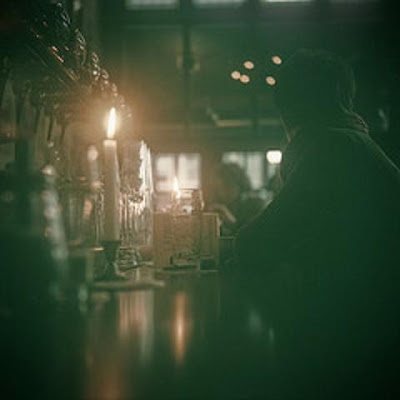Since my readership is very slim, to say the least, I feel relatively free to talk about a subject no one seems to want to mention. It's tiptoed around, or recoiled from, both from fear it will happen to someone they know, or from the kind of entrenched stigma that buries certain topics due to intense shame.
I heard of a death not long ago, and it was not someone I knew. I read the announcement on a friend's Facebook page, and even though I am removed from the situation, I found it disturbing. It pertained to a 42-year-old man, a teacher, who died suddenly and shockingly, leaving the family "devastated". There was a very long passage about what a beloved figure he was among his students and colleagues. All through this description of the man's life, I kept thinking, suicide. I could not be sure, but it was written all over the passage, the shock and despair that seemed beyond a more natural death. Certainly no other cause of death was listed anywhere, which was unusual for one so young. Even the long passage about his achievements and his status as a much-loved figure carried a faint sense of "we don't know how this could have happened to a man like this". Not homeless, not a drug addict or an alcoholic, but the kind of person who would never think of such a thing because he was so accomplished and well-liked.
Then, a couple of weeks later, there was a sort of updated statement, saying that the family had thought it over and decided to talk about the fact that he had committed suicide. One of the first things they said (which was also included in the first notice) was how gentle his passing had been. They insisted "he felt no pain". I was stunned. I have experienced suicidal depression, and it's like trying to pull yourself out of the mouth of a dragon before you are ripped apart or immolated. There is no peace. It is never painless. How could it be, if you've just decided to destroy yourself and deprive the world of a totally unique human presence - forever?
I assume they were referring to his lack of pain AS he committed suicide, or lack of pain AFTER he committed suicide - neither of which make sense to me at all. No, you don't feel pain when you are unconscious. Or dead.
I don't blame the family for all these tortuous twists and turns. Obviously it's important to them to think he didn't suffer, which after a suicide is as incongruous a statement as I have ever heard. I cannot be too judgemental, however, as they were reacting the way 90% of people do. But it does point up how people struggle with this raw fact, that people do, yes, DO commit suicide, even if their anguish and despair isn't obvious to others. ESPECIALLY if. This man had been, apparently, acting for most of his life, and one day he just couldn't do it any more. Or so it would seem.
More odd things struck me. The fact that his memorial is taking place in a bar shook me, because then I wondered if he was an alcoholic. Perhaps not, and I am sure the family would vehemently, even angrily deny this. But surely, somewhere in academia, someone else might be - statistically, even! - and perhaps a recovering one. Someone who can't or must not drink would have to sit around with people who are drinking, perhaps rather heavily because they are in so much pain, supposedly in their colleague's honor, and the alcoholic at the table - even if sober - must sit there smiling with a gut full of unexpressed grief.
The expectation is that everyone will sit around sipping scotch (they even mentioned this specifically) and heartily sharing funny and fond reminiscences and anecdotes about a man who JUST KILLED HIMSELF BECAUSE HE COULDN’T STAND BEING ALIVE ANY MORE. Of course, if you cry and feel agony at such a gathering, it’s completely inappropriate to express it, and you have to leave. What are you supposed to do - sit at a table, in a bar, in a public place, and put your head down on the table and sob with raw anguish? Or is raw anguish completely inappropriate these days?
Your choices are to leave and run to the bathroom (meaning someone else at the table is in the awkward position of having to run after you while the rest of the party looks at each other uncomfortably), to stay and bring the rest of the party down and completely kill the atmosphere of heartiness and humor, or -
The only option that is socially acceptable is to just swallow your grief and pretend you're all right, even enjoying the evening. Everyone else is, after all - aren't they? If they aren't, who is going to start talking about it and ruin the occasion? You can do your crying at home.
But when you get home, you find it has all turned to stone.
Does this set of impossible choices have anything to do with the social dynamics that lead a man to take his own life? Does it have anything to do with agonizing loneliness, with a sense of being set apart from everyone else, afraid of your own feelings? Of having to "keep it up", swallowing it continually for years and years and keeping the act going until one day it fatally implodes?
Memorials are “celebrations of life” now, with no tears or grief allowed unless it’s “happy” grief (whatever that is). At very least, you are expected to run to the bathroom and do it there, along with other bodily functions. I don't know what the answer is, but when I heard about the memorial in the pub, even in the first announcement where cause of death was mysteriously not mentioned, I winced. The idea of a "wake" may still be around, and I'm not against it, but I don't think these generally take place in a public space.
There is no suicide rule book, no etiquette, but I am alarmed at how quickly people jump to hide the scars, even to minimize what has happened or reassure everyone that it was, after all, a painless event - at least for him, a man ending his own life. But painless only in the unconsciousness that leads to death, a conundrum I will never be able to resolve.















































